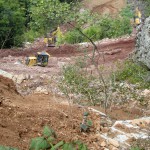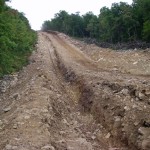The proposed construction of multiple 42-inch pipelines across the central Appalachian mountain and valley region threatens severe water resource damage. The region’s difficult topography and complex hydrology will present overwhelming problems —even if pipeline construction proceeds with strict adherence to regulations and best management practices.
Based on what we’ve seen in the region, we expect ineffective regulatory oversight and careless construction practices.
So what can we, as citizens, do to protect our water resources in the face of a major threat and a broken regulatory system:
- Review annual standards and specifications submitted by the pipeline developers to the Virginia Department of Environmental Quality (VADEQ), and challenge approval if the these submissions are inadequate to ensure compliance with erosion and sediment control (ESC) and storm water management requirements.
- Review the site specific ESC plans submitted for the projects, and challenge approval if the plans are incomplete or otherwise deficient.
- Review requests for waivers to open-trench limitations and other critical ESC measures, ask the companies and the VADEQ to identify the criteria used for requesting and considering such waivers, and challenge inappropriate approvals.
- Review the general Plans and Procedures documents used by the Federal Energy Regulatory Commission for pipeline construction projects and recommend changes to provisions that are inadequate for central Appalachian conditions.
- Petition the Forest Service to develop the staffing resources and capability needed for effective review of proposed pipeline development across national forest lands.
- Review and provide input concerning protocols for inspection of pipeline construction projects by the VADEQ and Forest Service.
- Seek access to agency and company inspection reports in a meaningful time frame.
- Monitor stream and water supply impacts of the pipeline construction projects.
- Conduct aerial surveillance of pipeline construction projects for compliance with ESC and storm water management plans and requirements.
- Pursue legal action if necessary to ensure compliance enforcement.
- Petition our elected officials to increase funding to the Forest Service and the VADEQ to improve project review, inspection, and enforcement capabilities.



